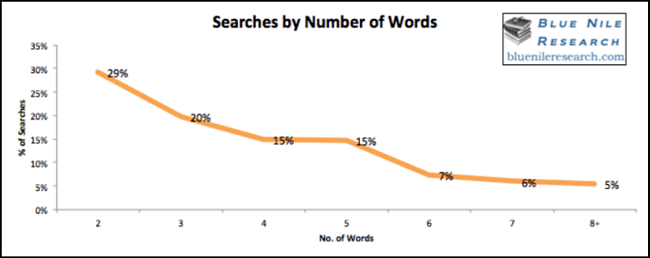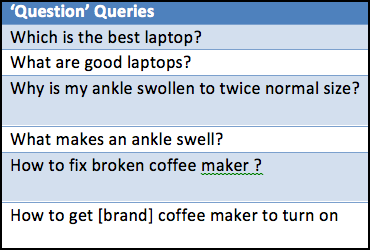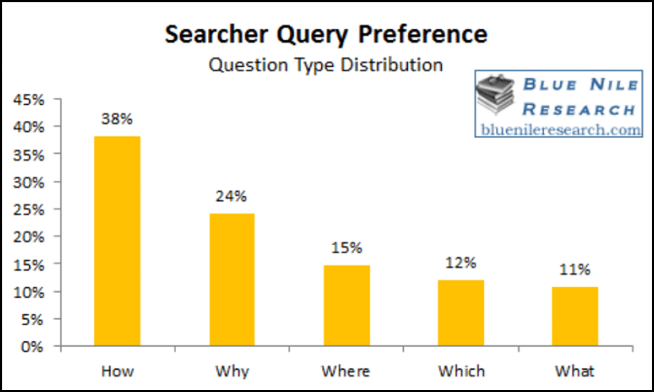The Psychology of the Searcher: How knowing how our prospects search can help us to optimize our campaigns
As marketers, most of us are familiar with the basics of search engine optimization, and how we can leverage certain industry-specific keywords and headlines in order to increase page visibility for our target audience.
Without a robust understanding of how prospects are actually interacting with search engines, how can we be confident that our SEO strategies are grounded in reality, rather than based on hunches or our own individual search biases?
Blue Nile Research recently carried out a study to discover how real customers are actually searching the Internet. How long are their queries? What form do they take? Are there universal patterns in the way that people search?
For this study, a sample of randomly selected test subjects were asked to search for solutions to three routine scenarios:
- A technical problem (broken coffee pot)
- A health issue (injured ankle)
- An ecommerce scenario (buying a new laptop)
When testing was complete and researchers aggregated all of the search queries, the most interesting finding wasn’t that one search pattern outperformed another. Rather, researchers were fascinated to find that few underlying patterns existed at all in the search data.
Instead of there being a learned, established protocol for the way people search, the search terms, length and form that subjects used appear to be the intimate expression of the individual human that created it.
It seems that, just as our genetic makeup is unique to each of us individually, so is the way in which we choose to search the Internet.
Key Findings
When analyzing the data, Blue Nile found that subjects were split evenly in terms of searching in short fragments (“sore ankle”) versus fully-formed terms (“causes of sore ankle”). This suggests that users are equally predisposed toward either speed of search (fragments) or depth of search (more specific terms).
When analyzing query length, no specific number of words dramatically outperformed any other.
Researchers found a larger split between users who search in statements versus those who search in the form of a question. 73% of subjects favored statements (“broken Folgers coffee pot”), while 27% tend to input their searches in the form of a question (“How to fix a broken Folgers coffee pot”).
Of the users who favor query-based searches, “how” was the most popular question type, followed by “why,” “where,” “which” and “what.”
Key Takeaways
As marketers, in addition to leveraging the right keywords, it is vital that we understand how our prospects choose to search in order to develop effective search and content strategies. We must be prepared to be visible in search results as varied and unique as individual customers themselves.
Because search habits are so deeply personal, it may be easy for us to put too much weight behind our own personal search biases when planning our search campaigns. Just because we have a specific way of searching (“sprained ankle symptoms”) does not mean that others will perform similar searches (“how can I tell if my ankle has been broken?”).
Blue Nile’s study underscores the deep importance of market-based research to supplement automated keyword creation.
Tools like Google’s Keyword Planner are certainly valuable for discovering new keywords, but tools have a hard time thinking outside the box like we can as humans.
For example, using Keyword Planner to find keywords for a long-tailed phrase “Samsung DVD player won’t play disc” will generate mostly irrelevant results, such as “DVD player,” “Best DVD player,” “Buy DVD players” and “DVD player reviews.”
In closing, I’ll leave you with three simple tips to help better align our search strategies to the wide variety of queries our prospects will likely use to find us:
- Get together with colleagues or friends to brainstorm different search queries that may be used to search for our product or service. Based on Blue Nile’s research, you’ll likely be surprised by the variety and breadth of different answers you discover. As a secondary measure, you can also build an Excel spreadsheet to automatically match/fill question modifiers to your keywords.
- Based on the above exercise, leverage the most likely question-based query in your headline in order to help shoot your page up the search rankings (e.g. “How to fix a broken coffee pot”).
- If feasible, survey your customers about their unique search patterns. Even though Blue Nile did not find statistically significant patterns in search queries from the general population, you may discover patterns or trends among your own unique, market-specific user base.
You can follow Ken Bowen, Manager of Editorial Content, MECLABS Institute, on Twitter at @KenBowenJax.
You might also like
Marketing Research Chart: SEO most effective tactic for lead gen, but also among the most difficult [From MarketingSherpa]
Marketing Research Chart: Which local SEO tactics are organizations using? [From MarketingSherpa]
Marketing Research Chart: To improve SEO effectiveness, content is king [From MarketingSherpa]








Great article Ken… great study done by Blue Nile.
I had a feeling for a long time that KeyWord Planner is left behind all that keywords stuff.
The importance of semantic words makes it so hard to use keyword planner and bring kw’s from there.
Lately I am more and more tempted to leave all that KW research and just write content (because I believe that at some point google will start to recognize quality of the content just by their content – and will not regard kw’s)… That’s their biggest task… recognizing content better (backlinks are secondary, by my opinion).
This just proves I am on a right track (more or less)… the traditional keyword use is not something we should do anymore!
Thanks for the kind words Jacob, and awesome point about content. I would caution against abandoning keyword use entirely — I don’t think we’re quite there yet — but writing great, relevant content is definitely a great way to supplement KWs/traditional SEO strategy, build influence, and help solidify our futures.
Hi Ken,
Thanks for covering our study–great writeup of the findings. I like the advice you give to marketers to ensure broad keyword coverage.
Nathan Safran
Blue Nile Research
Thanks Nathan! It was a fascinating study that really changed the way that I think about search. Really looking forward to seeing what you and the team at Blue Nile have in store in the future!